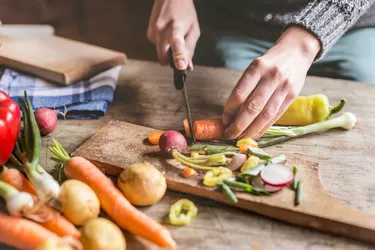Eligibility for federal food assistance — now called the Supplemental Nutrition Assistance Program or SNAP, instead of "food stamps" — depends in part on your monthly income and in part on what assets you have that can be quickly turned into cash. Federal guidelines specifically exclude houses from that category, so you don't have to sell your home to receive assistance.

Video of the Day
How it Works
SNAP stretches recipients' purchasing power so that they can buy healthy food and improve their diets. SNAP is not meant to cover beneficiaries' entire grocery bill and you do not have to be impoverished to be eligible. SNAP also helps local economies by giving households more money to spend at grocery stores in their communities. Income is the chief factor in determining your eligibility for SNAP and your monthly benefits. Your household must receive less than 130 percent of the federal poverty rate in take-home pay per month to be eligible. The poverty rate's exact dollar amount changes annually and takes into account how many people live in a given household. Other financial resources, such as bank accounts, can affect your eligibility as well.
Video of the Day
"Countable" Resources
Once you demonstrate that your household's income is within the range covered by SNAP, you must show that you have less than $2,250 in countable resources. If at least one person in your household is disabled or over the age of 60, you can have up to $3,500 in countable resources. Countable resources are cash, bank accounts, bonds, stocks and cars that are not used for work purposes. SNAP guidelines specifically exclude houses, trailers and lots from the countable resources category.
Houses and Other Property
If you own your house, condominium, a lot, a motor home or any other shelter, ownership cannot disqualify you for SNAP. When you apply for food assistance, the application will ask you for the amount that you pay each month in mortgage or other loan payments. Depending on the amount of the payments, you may be able to deduct some of those payments from the initial take-home pay that you report, and as a result receive more SNAP benefits.
The Underlying Reasoning
Countable resources are possessions and extra money that a person can use to cover expenses during hard times. Houses are excluded from this category primarily because the government wants homeowners to keep their homes. Furthermore, while houses can be a good way to store wealth, selling a house takes a lot of time and energy, whereas selling stocks or withdrawing money from a savings account can be done almost immediately.